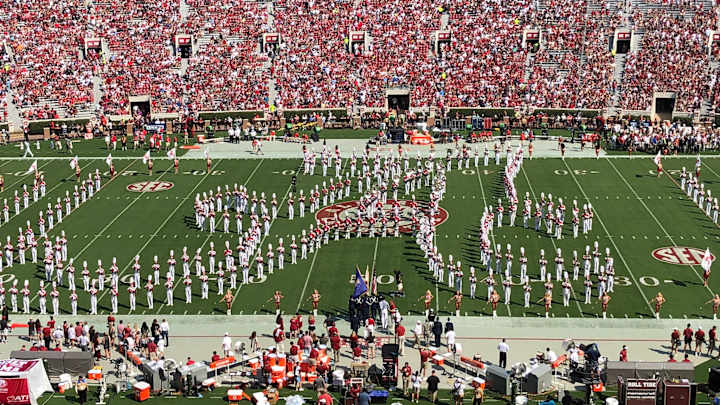Daily Dose of Crimson Tide: The Million Dollar Band

Before each game, the various sections of the marching band gather in the heart of the campus, the area known as the Quad, go through their pregame warmups, have a little fun with tailgating fans and kids, and then come together as part of the crescendo to kickoff.
The concert begins on the library steps, with the eventual procession, accompanied by more cheerleaders and majorettes than you can twirl a baton at, leading everyone to Bryant-Denny Stadium in time for pregame festivities and to see the Crimson Tide take the field.
It features the Fleetwood Mac song "Tusk" and the first of numerous renditions of the signature song, “Yea Alabama,” which mentions early rivalries against Georgia and Georgia Tech and honors the team’s heritage with the line “Remember the Rose Bowl, we’ll win then.”
When he was coaching the Crimson Tide, Mike Shula would ask boosters to sing the first couple of lines of the song. If they got the line “drown them Tide” correct, he knew they were real fans.
However, a good Saturday ends with the controversial cheer “Rammer Jammer” to celebrate a victory.
It goes like this (with musical accompaniment from a roaring 370-member marching band and a screaming student section), say after beating a team like Tennessee:
“Hey Vols!
“Hey Vols!
“Hey Vols!
“We just beat the hell out of you. Rammer Jammer, Yellow Hammer, give ’em hell Alabama!”
Rinse. Repeat if necessary. Repeat again if it was a big game. Repeat all offseason if the opponent was Auburn.
FYI, the yellow hammer is the state bird.
Although the marching band was created in 1913 as a 14–person unit, it picked up the “Million Dollar Band” nickname in 1922 thanks to alumnus W.C. “Champ” Pickens, supposedly in reference to its fund-raising prowess.

The 1948 Alabama football media guide described the name’s origins as follows:
“At the time the band was named (1922), it was having a hard struggle. The only way they could get to Georgia Tech for a game was by soliciting funds from the merchants. They usually had to ride all night in a day coach, and we thought it was swell when we finally got a tourist sleeper and put two to a lower and two to an upper berth.”
During that Georgia Tech game in 1922, won 33–7 by the Yellow Jackets, an Atlanta sportswriter commented to Pickens, “You don’t have much of a team; what do you have at Alabama?” Pickens replied, “A Million Dollar Band.”
According to the band’s Internet site, there have been seven band directors through 2019: Dr. Gustav Wittig (1913–17); Captain H.H. Turner (1927–34); Colonel Carleton K. Butler (1935–68); Earl Dunn (1969–70); Dr. James Ferguson (1971–83); Ms. Kathryn B. Scott (1984–2002); and Dr. Kenneth Ozzello (2003–19). From 1917 to 1927, the marching band was led by students.

Some of this post originated from "100 Things Crimson tide Fans Should Know & Do Before They Die," published by Triumph Books
